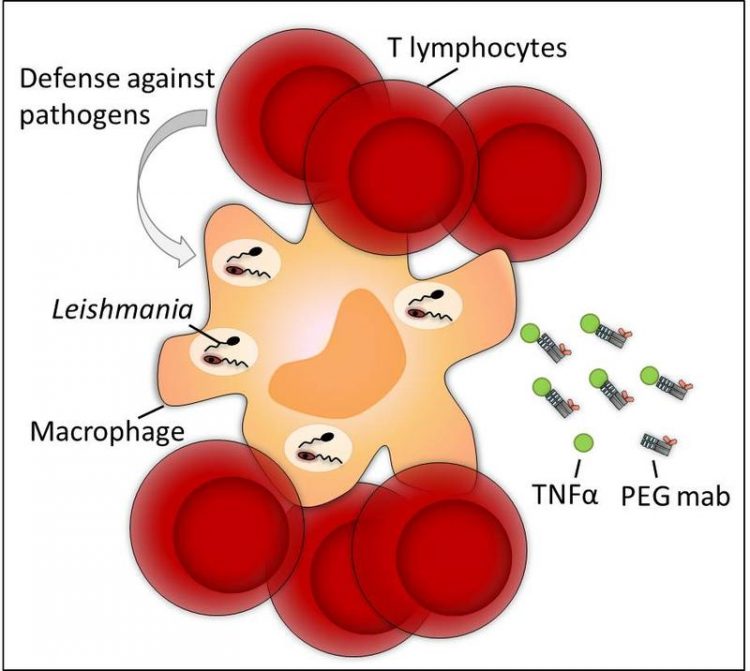Small difference, significant effect: How antibodies influence the defense against infections

Monoclonal antibodies (mabs) against TNFα influence the defense against a leishmania infection at different rates. Source: PEI
Autoimmune diseases are chronic inflammatory diseases in which immune cells erroneously attack the body’s own cells or tissue. In these diseases which, for example, also include rheumatoid arthritis, psoriasis, or chronic inflammatory diseases of the intestine such as Crohn’s disease, TNFα plays an important role. Among other things, it conveys the classic inflammatory symptoms: swelling, redness, and pain.
However, TNFα is a versatile cytokine which, in its role as a central regulator of the immune system is also important for the defense of pathogenic agents. Thus, there is evidence that the treatment with mabs blocking TNFα involves an increased risk of infectious disease. However, the data obtained up to now are contradictory.
Furthermore, an increased occurrence of the parasitic disease leishmaniosis was reported in patients treated with a particular mab. Leishmaniosis is caused by the single-cell parasite leishmanial transmitted by sand flies. The disease above all occurs in the Mediterranean, tropical regions, and Asia. Around one million people contract the disease world-wide each year.
Do TNFα-blocking mabs differ in their influence on the immune defense of the body? Researchers led by Professor Ger van Zandbergen, head of Division Immunology of the Paul Ehrlich Institut and Dr Katharina Arens have studied the influence of various TNFα-blocking mabs on the immune response of human immune cells against leishmania. The studies were performed by the researchers in vitro – outside the body.
For this purpose, they infected macrophages, certain immune cells of the body which are preferably infected by leishmainia, with the parasite. Then they added different mabs and T-lymphocytes. T-lymphocytes, in their role as important immune cells, are normally able to recognise infected macrophages, to replicate as a result of this contact, and to combat the pathogen directly.
The reactions of the T-cells to the parasite in the presence of the different mabs differed greatly. While some mabs markedly reduced T-lymphocyte activity thus enabling the parasites to replicate, the effect was lower with another mab – and replication of the leishmania was prevented.
In a next step, the researchers of the PEI compared the molecular structure of the mab showing the different action profiles. In doing so, they found that polymer polyethylene glycol (PEG) was the molecule that causes a small but significant difference. It primarily extends the half-life of the effect created by the antibody, since it protects from the body’s own digestion of the antibody: PEGylation – the adherence of the PEG to the mab at defined sites reduces the inhibitory effect of TNFα-blocking mabs on the immune defense against leishmanial.
The researchers conclude from these results that only small PEG modifications of TNFα inhibiting mabs are able to reduce effects that weaken the immune defense. In the researcher’s view, the differences between the mabs with regard to immune defense should be further studied in order to gain insights on the road to effective and even safer medicinal products.
The Paul-Ehrlich-Institut, the Federal Institute for Vaccines and Biomedicines, in Langen near Frankfurt/Main is a senior federal authority reporting to the Federal Ministry of Health (Bundesministerium für Gesundheit, BMG). It is responsible for the research, assessment, and marketing authorisation of biomedicines for human use and immunological veterinary medicinal products.
Its remit also includes the authorisation of clinical trials and pharmacovigilance, i.e. recording and evaluation of potential adverse effects. Other duties of the institute include official batch control, scientific advice and inspections. In-house experimental research in the field of biomedicines and life science form an indispensable basis for the manifold tasks performed at the institute.
The Paul-Ehrlich-Institut, with its roughly 800 members of staff, also has advisory functions nationally (federal government, federal states (Länder)), and internationally (World Health Organisation, European Medicines Agency, European Commission, Council of Europe etc.).
Originalpublikation:
Original publication: Arens K, Filippis C, Kleinfelder H, Goetzee A, Crauwels P, Reichmann G, Waibler Z, Bagola K, van Zandbergen, G (2018): Anti‐TNFα therapeutics differentially affect Leishmania infection of human macrophages. Front. Immunol., 31 July 2018 |
https://doi.org/10.3389/fimmu.2018.01772
https://www.frontiersin.org/articles/10.3389/fimmu.2018.01772/full – Text of the Publication
https://www.pei.de/EN/information/journalists-press/press-releases/2018/14-small… – This press release on the PEI-Websiste
Media Contact
All latest news from the category: Life Sciences and Chemistry
Articles and reports from the Life Sciences and chemistry area deal with applied and basic research into modern biology, chemistry and human medicine.
Valuable information can be found on a range of life sciences fields including bacteriology, biochemistry, bionics, bioinformatics, biophysics, biotechnology, genetics, geobotany, human biology, marine biology, microbiology, molecular biology, cellular biology, zoology, bioinorganic chemistry, microchemistry and environmental chemistry.
Newest articles

A ‘language’ for ML models to predict nanopore properties
A large number of 2D materials like graphene can have nanopores – small holes formed by missing atoms through which foreign substances can pass. The properties of these nanopores dictate many…

Clinically validated, wearable ultrasound patch
… for continuous blood pressure monitoring. A team of researchers at the University of California San Diego has developed a new and improved wearable ultrasound patch for continuous and noninvasive…

A new puzzle piece for string theory research
Dr. Ksenia Fedosova from the Cluster of Excellence Mathematics Münster, along with an international research team, has proven a conjecture in string theory that physicists had proposed regarding certain equations….



